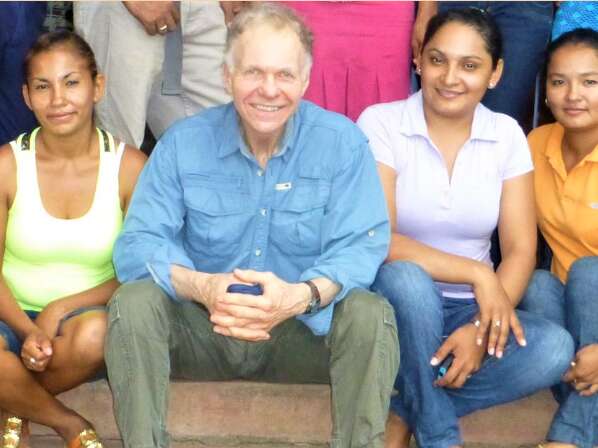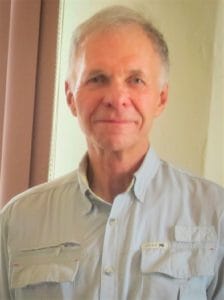CGU Gets WiRED for the Greater Good

New faculty member Gary Selnow is bringing more than just professorial degrees and decades of teaching experience to CGU; he’s bringing with him the nonprofit that he founded in 1997 and that he continues to direct, WiRED International.
Selnow and faculty from CGU’s School of Community & Global Health (sCGH) and the Division of Behavioral & Organizational Science (DBOS) have collaborated to develop the CGU WiRED International Center of Community and Global Health.
For SCGH Dean Jay Orr, Selnow’s arrival and this new collaboration couldn’t be more timely.
“Gary and WiRED have terrific international credentials, and we’re thrilled to welcome him,” said Orr. “What we’ve always realized, and what the global pandemic has especially show us, is how health education can make a critical difference for communities anywhere around the world. WiRED’s record of helping these communities is outstanding, and our SCGH students will have many opportunities to work with Gary and get involved in this work firsthand.”
Overcoming Hurdles with Tech
Selnow’s WiRED started operations during his Fulbright Fellowship in 1997 by providing internet connections to war-ravaged towns throughout the former Yugoslavia and using them to promote democracy and learning. Today the organization uses computer technology to focus on medical and health education in underserved regions around the world.
The training modules developed by WiRED have become invaluable global resources that are used by hospitals, clinics, schools, other non-governmental organizations, universities, and individuals seeking health information.
Selnow’s program got underway this fall at CGU as part of SCGH; co-directors working with Selnow are SCGH Professor Alan Stacy and DBOS Professor William Crano.
Trained community health workers fill a big gap when there aren’t doctors or nurses available, says WiRED’s Selnow.
“It’s a kind of hybrid arrangement between our nonprofit and CGU. I’ll direct the activities which will consist mostly of running the programs, engaging students and faculty in many ways including taking students on tours of overseas facilities, and acquainting them with some of the projects with which WiRED is involved,” he said.
According to Selnow, for years WiRED has used computers for general community health education (the nonprofit was originally known as World Internet Resources for Education and Development but now is known only by its acronym, which is much easier to remember). Several years ago, WiRED began to focus its efforts on training community health workers in areas that really needed them.
“There is just a huge need for community health workers,” Selnow explained. “It’s particularly evident now in the days of COVID, but for people who work in low-resource regions, they don’t have doctors or nurses, and so the community health workers fill the gap. So, we decided to train community health workers and give them a really good grounding. If you train one worker, you’re reaching a whole lot of people in that community.”
Going forward, that’s what Selnow envisions that WiRED will be doing at CGU with students who want to become involved in this work.
COVID-19’s Challenges
Selnow ruefully admits that the onset of the global pandemic threw a monkey wrench into WiRED’s training programs, which had been conducted live and face-to-face. But with COVID came the necessity of using remote Zoom training which, so far, has worked out well as a substitute for in-person training sessions.
“Right now we have a number of infectious disease training modules, including specific modules on COVID,” Selnow said. “A lot of our community health workers are focusing on that and that’s understandable. If, God forbid, another outbreak of some kind should occur, we’ll be able to respond with training modules within days and community health workers around the world will be able to study those modules and get up to speed with what they need to know.”

WiRED teaching is done in real time with a physician or nursing professor leading the Zoom class.
“We try to keep the classes small (between 15-20 people) whether they’re face to face or on Zoom,” Selnow said. “They get unwieldy beyond that. We want to have a class size so that any student with any issue can raise questions in the context of the conversation. If you get bigger than that, it becomes a mob.”
Selnow stresses that WiRED is an all-volunteer organization.
“We don’t pay anybody and I don’t get paid,” he said. “And that fact makes these people extraordinary. I pick up the phone and ask for help and we’ll have doctors and nurses and tech folks say, ‘We’re on it!’ That’s how we can complete a module in 24 hours. “
This spirit of volunteerism to help humanity is encouraging to Selnow.
“There are hundreds of people in the U.S. who are willing to roll up their sleeves and help folks in distant places that they’ll never see,” he said. “It’s just a wonderful example of how people can help each other across boundaries, time zones, etc., without the usual rewards and in obscurity.”
That commitment to service and impact over reputation and status nicely fits with the CGU mission, too.